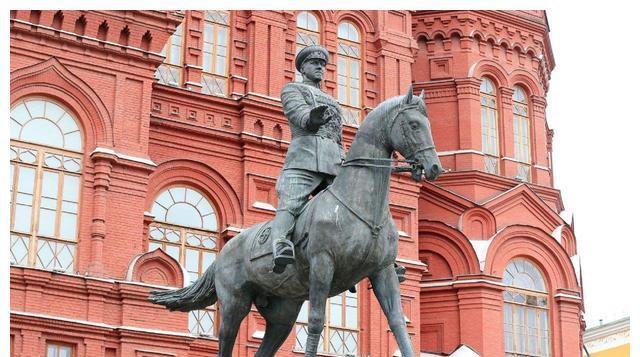Zhukov is known as the god of war in the Soviet army and even in Russian history. He established the Meritorious Service in World War II. At the beginning of the Great Patriotic War, Zhukov turned the tide, commanded the defense of Moscow, and saved the city at the height of Leningrad's crisis. In 1942, Zhukov organized the Battle of Mars, the counterattack on the first line of the Don River, and coordinated the actions of the various fronts in the counter-offensive phase of the Battle of Stalingrad as the representative of the Supreme Commander. As a representative of the High Command, he organized and coordinated the counter-offensive on the Dnieper, the Battle of Colsund, the Battle of Bagration, and participated in the Battle of Vist-Oder and the Capture of Berlin as commander of the Front.

Zhukov's statue in Moscow
After the war, Zhukov's prestige reached its peak. He became Commander-in-Chief of the Soviet Army and commanded Soviet troops stationed in Germany, participating in consultations with the Allies. But then Zhukov's situation took a sharp turn for the worse. In 1948, he was tried by the Soviet "Court of Honor" for "improper possession of booty", which made his reputation stink. In that year, he was dismissed from the post of commander-in-chief and transferred to the commander of the military region. The following year he was removed from his post as commander of the remote Siberian Reserve Military District. This military region was not in any important strategic direction, nor did it have troops worth mentioning, and Zhukov was still under surveillance in the local area and was not allowed to return to Moscow, which was equivalent to exile in disguise.
Zhukov
The Russian era after 1991 also revealed NKVD documents. The NKVD was the department responsible for internal cleansing in Soviet Russia in the 1930s and 1950s. Documents show that NKVD had been ordered to draw up a plan to assassinate Zhukov and end the marshal's life with an "accident" when necessary. Because Zhukov had great prestige in the Soviet army, it was not suitable to directly attack, so the method of assassination was used.
Conquer Berlin
So why is all this happening? The prevailing narrative is that Zhukov offended Stalin. After the end of the war, Zhukov's command ability was useless, and he was able to cross the river and tear down the bridge, unload and kill the donkey. There is some truth to this, especially zhukov's excessive elevation of his own merits after the war (after all, the war was not fought by him alone), which will certainly cause the dissatisfaction of quite a few people. But this is not the main reason.
Soviet army
Zhukov was really just a "target", and Zhukov's exile was a means for Stalin to suppress the Soviet forces. In the 4 years of war, the Soviet army has become the core of the entire alliance, and all departments revolve around the war and serve around the Soviet army. The Soviet generals gained great power and incomparable prestige in the war. After the war was accepted, neither Stalin nor anyone else could allow this situation to continue, and suppressing Soviet generals became a means of suppressing the excessive power of the Soviet army. In fact, Zhukov is only one of many unlucky people. For example, the commander-in-chief of the Soviet Air Force was simply arrested and imprisoned after the war, and the commander of the Soviet Navy was dismissed from his post and thrown to the Far East as an idle post. Koniev, Rokossovsky and others were warned, but they changed their attitude quickly and were spared.
Zhukov and Eisenhower
On the other hand, the alliance quickly entered a standoff with the U.S.-led Western bloc after World War II. Zhukov, precisely because of the late war and the post-war occupation of Germany, had excellent personal relations with American and British generals. This also aroused Stalin's vigilance. And according to NKVD's surveillance of Zhukov's phone, the field marshal repeatedly complained about the huge losses suffered by the Soviet army in the war due to excessive intervention by the High Command, and believed that the weapons and supplies provided to the Soviet army by the United States and Britain through the Lend-Lease Act played a huge role. This also caused trouble for Zhukov personally.